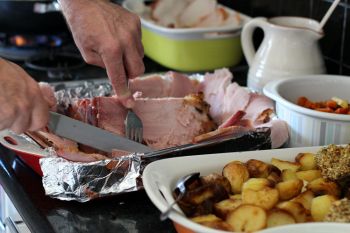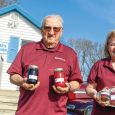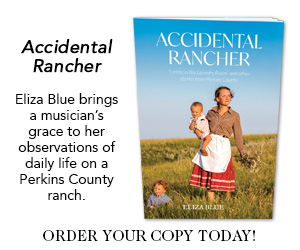The Gift of South Dakota
Subscriptions to South Dakota Magazine make great gifts!
Subscribe today — 1 year (6 issues) is just $29!
Prairie Potlucks: Our Idea of a Dinner Party
I was stunned to read a popular columnist's opinion that inviting friends for a potluck meal, with each contributing food, is impolite. Without potluck, we who live in the West wouldn't have many parties.
The expression "take potluck" was first recorded in 1592, when peasants kept great iron pots simmering over constant hearth fires, tossing in leftovers after each meal. Servants might scavenge scraps from the meals of a rich landlord. The pot's constant heat made the mixture safe to eat, and a visitor took the chance that he'd get enough of what remained. The expression came to mean, "It's nothing fancy; just what we usually have," or "plain fare." The French called the ordinary family dinner the "fire pot," pot-au-feu, and raised it to a high culinary art with spices and herbs. In Ireland, the "pot of hospitality" always hung over the open fire; any unexpected visitor was invited to dip his own cup or bowl into the concoction.
People who live in the country don't necessarily keep a pot simmering on the stove all day, though many of us still use meat and vegetable scraps — even washed peelings — to make our own soup stock, making nourishment out of what might be waste in other households. Thawed and enhanced with garden extras, such stock becomes a hot supper in minutes, our version of instant soup. Country people don't entertain the way city people do, anyway. Asking folks to drop in for a cocktail before the play when you live 40 miles from the nearest theater is impractical. Driving time isn't the only consideration when inviting guests. For example, I seldom invite guests between November and June. If we have a heavy snowfall, unless they have a four-wheel drive vehicle, they can't get in or out of the ranch. If they don't realize this, I may be forced to explain that my road is impassable, then listen in dismay as they insist otherwise. Later, when they are thoroughly stuck, I will get out my truck, tow rope and shovels, and dig them out. After dinner, I may have to repeat the process. Sensible or native-born guests may call an hour ahead to cancel; I appreciate their wisdom, but I'm stuck with a large meal to be stored in the freezer and consumed for weeks to come. These are not inspiring reflections as one ponders dinner invitations.
Parties planned for summer months usually have fewer interruptions, though a prairie fire may claim half the men and women in the community for fighting fire. A hard rain eliminates the fire danger, but visitors' tires leave deep ruts in the muddy road. As we smack our heads bouncing over them in corning months, we'll reminisce, "Remember that rain, when Larsons slid into that ditch and got stuck? Now that was a good rain!"
For all these reasons, we tend to entertain everyone at once, wiping the slate clear of social obligations. To avoid spending a week cooking, a busy woman may issue invitations to a potluck.
A potluck dinner is my favorite entertainment, whether I'm the hostess or a guest. People of different backgrounds and cooking habits contribute to a meal unlike any other, and if the conversation drags, asking for a recipe will start it again. Some of my friends are vegetarians, welcome as long as they don't disparage my profession of cattle raising, who bring tasty dishes composed of ingredients new to me. Putting warning labels on meat dishes is a small price to pay for the recipe for tabouli salad. In a world where not all families are nuclear, a male guest may contribute new tastes; that's how I learned about sorrel and walnuts as salad ingredients. The same guest gave me slips of sorrel, lovage, anise and lemon thyme for my herb garden.
Though much of the food is already prepared when it arrives, I've enjoyed warm kitchen conversations as guests chopped, sliced, warmed, or frosted their dinner offerings; a guest, man or woman, who has prowled through your utensil drawer looking for a serving spoon has already broken through social barriers that can prevent us from speaking honestly to one another.
And when the party begins to wind down, guests don't simply grab their coats, mutter polite inanities, and leave. They take their empty serving dishes with them, moving half the dishwashing job to other kitchens. Other guests discover that "only a spoonful" of their dish is left, and dive into the kitchen to transfer it to a refrigerator container instead of allowing it to mold in their own refrigerator; with luck, the hostess can nibble for several days on food she has not cooked.
We westerners have another potluck custom that polite society might not approve; when guests begin to get restless and collect their dishes, the hostess trots right along beside them and fills up the pan with something edible. That way, her hospitality extends beyond the current meal, and everyone gets a chance to take home something cooked by another. One such exchange inspires another, and soon guests are happily trading leftovers; at the same time, they usually whisk paper plates and trash into the garbage can, gather their children's toys, and rinse dinner plates to be stacked beside the sink. When the hostess finally faces her kitchen alone, at the moment of truth, she will often find it much neater than it has any right to be after the feeding of 40 people.
I think potluck entertaining, rather than being impolite, is a useful social tool particularly fitting for today's busy, nontraditional families. Time is precious to working families, who often find they no long entertain; instead, the family snarls over boxed fast food. Instead of a meal being a time-consuming ordeal testing a hostess' social skills, a potluck requires only a small contribution from each guest. Guests are not merely filling an evening but joining in a time-sanctified ritual; once you have broken bread with a guest, he becomes your friend, to defend as you might your own family. Potlucks can create a real community as it existed when people were really neighbors, dependent on one another, though today's guests may be brought together by interests rather than proximity.
Editor’s Note: This story is revised from the September/October 1995 issue of South Dakota Magazine. To order a copy or to subscribe, call (800) 456-5117.











Comments